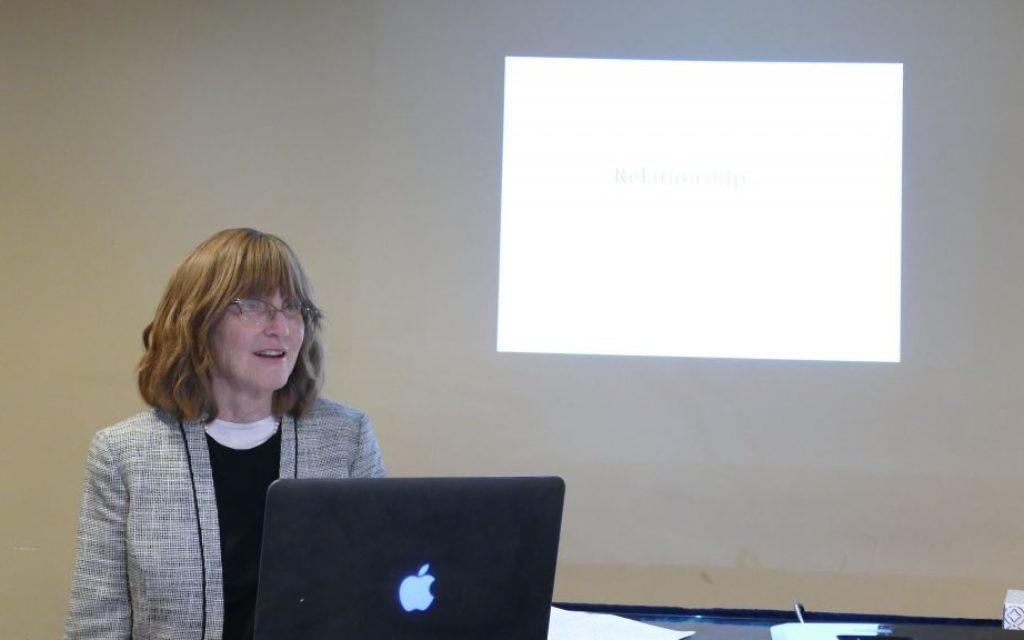Orthodox Community Confronts Sexual Harassment
New Toco Shul played host to a recent discussion on the problem with psychotherapist Linda Freedman.

The Orthodox Jewish community isn’t immune to the types of sexual misconduct that sparked the #MeToo movement the past year.
“Sexual harassment in the community is routine,” Congregation Beth Jacob Rabbi Ilan Feldman said. “The conversation in the Orthodox community I think needs to start before we get to sexual harassment or protecting women or being decent to women. It has to do with the sanctifying notion of modesty that teaches to respect individuals, and we don’t have that conversation.”
Psychotherapist Linda Freedman spoke about the origins of sexual harassment, its differentiation from assault and possible solutions during a workshop on sexual harassment in the Orthodox community Wednesday, Feb. 14, at New Toco Shul.
Get The AJT Newsletter by email and never miss our top stories Free Sign Up
Freedman said that in a New York study of 360 married Orthodox women ages 19 to 58, one-quarter said they had experienced some form of sexual assault by age 24. The survey did not use probability sampling, meaning the numbers can’t be applied to the entire community, but Freedman said 360 volunteers from different Orthodox backgrounds is a healthy sample.
Most of the victimized women said they had been abused by age 13.
She defined sexual harassment as a form of coercion or a hostile environment with unwanted sexual attention. It could be an assignment, promotion or raise offered in return for the acceptance of sexual behavior, or it could be repeated romantic gestures, invitations, texts, calls or “chance” meetings.
Freedman said some men justify harassment through moral disengagement.
“They kind of lie to themselves and have to make a rationalization. Yet sexual harassment is always a serious charge,” she said. “Women are not flattered when they receive sexual attention. It makes them fearful and that they will be overpowered and sexually assaulted because one in four have been.”
The efforts of Congresswoman Martha Griffin led to the inclusion of sex as a protected class under the Civil Rights Act of 1964, Freedman said. The Supreme Court ruled in 1986 in the case of Meritor Savings Bank vs. Vinson that sexual harassment violated Title 7 of that law.
There are more similarities than differences between sexual assault and harassment, Freedman said, and studies have found a high correlation between a person’s proclivity to make objectifying remarks and to do bad things. She said anyone can be a target or perpetrator of sexual harassment, but it’s rarely reported.
“Most people don’t think they will be believed, and if they are believed, they’re blamed and told they brought it on,” she said. “The consequences are horrible. … People have memories they cannot forget and feelings they can’t get rid of.”
Freedman is working on a proposal for more effective ways for the prevention of sexual harassment in the workplace and conducts research at the Institutional Review Board at the Institute for Clinical Social Work in Chicago.
There are multiple reasons why people commit sexual harassment, Freedman said. “Feminists want to say it’s all about power. … It is all about power, but we also know a lot of people who have a lot of money and would never dream about doing this.”
Rabbi Don Seeman, a New Toco Shul member, said. “I don’t think anybody can deny that this is a problem that crosses all kinds of boundaries, and until synagogues start having open conversations, people will still feel intimidated and embarrassed and won’t know what the best practices are to protect themselves.”




comments